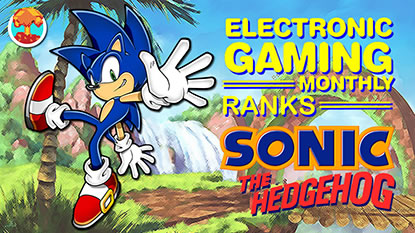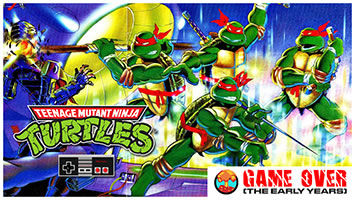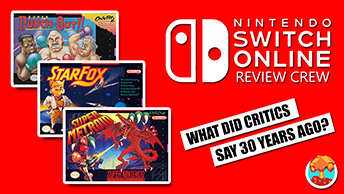- CLASSIC MAGAZINES
- REVIEW CREW
A show recapping what critics thought back
when classic games first came out! - NEXT GENERATION'S BEST & WORST
From the worst 1-star reviews to the best
5-stars can offer, this is Next Generation! - NINTENDO POWER (ARCHIVE)
Experience a variety of shows looking at the
often baffling history of Nintendo Power! - MAGAZINE RETROSPECTIVE
We're looking at the absolutely true history of
some of the most iconic game magazines ever! - SUPER PLAY'S TOP 600
The longest and most ambitious Super NES
countdown on the internet! - THEY SAID WHAT?
Debunking predictions and gossip found
in classic video game magazines! - NEXT GENERATION UNCOVERED
Cyril is back in this spin-off series, featuring the
cover critic review the art of Next Generation! - HARDCORE GAMER MAGAZING (PDF ISSUES)
Download all 36 issues of Hardcore Gamer
Magazine and relive the fun in PDF form!
- REVIEW CREW
- ELECTRONIC GAMING MONTHLY
- ELECTRONIC GAMING MONTHLY RANKS
From Mario to Sonic to Street Fighter, EGM
ranks classic game franchises and consoles! - ELECTRONIC GAMING MONTHLY BEST & WORST
Counting down EGM’s best and worst reviews
going year by year, from 1989 – 2009! - ELECTRONIC GAMING BEST & WORST AWARDS
11-part video series chronicling the ups and
downs of EGM’s Best & Worst Awards!
- ELECTRONIC GAMING MONTHLY RANKS
- GAME HISTORY
- GAME OVER: STORY BREAKDOWNS
Long-running series breaking down game
stories and analyzing their endings! - A BRIEF HISTORY OF GAMING w/ [NAME HERE]
Real history presented in a fun and pithy
format from a variety of game historians! - THE BLACK SHEEP
A series looking back at the black sheep
entries in popular game franchises! - INSTANT EXPERT
Everything you could possibly want to know
about a wide variety of gaming topics! - FREEZE FRAME
When something familiar happens in the games
industry, we're there to take a picture! - I'VE GOT YOUR NUMBER
Learn real video game history through a series
of number-themed episodes, starting at zero! - GREAT MOMENTS IN BAD ACTING
A joyous celebration of some of gaming's
absolute worst voice acting!
- GAME OVER: STORY BREAKDOWNS
- POPULAR SHOWS
- DG NEWS w/ LORNE RISELEY
Newsman Lorne Riseley hosts a regular
series looking at the hottest gaming news! - REVIEW REWIND
Cyril replays a game he reviewed 10+ years
ago to see if he got it right or wrong! - ON-RUNNING FEUDS
Defunct Games' longest-running show, with
editorials, observations and other fun oddities! - DEFUNCT GAMES QUIZ (ARCHIVE)
From online quizzes to game shows, we're
putting your video game knowledge to the test!- QUIZ: ONLINE PASS
Take a weekly quiz to see how well you know
the news and current gaming events! - QUIZ: KNOW THE GAME
One-on-one quiz show where contestants
find out if they actually know classic games! - QUIZ: THE LEADERBOARD
Can you guess the game based on the classic
review? Find out with The Leaderboard!
- QUIZ: ONLINE PASS
- DEFUNCT GAMES VS.
Cyril and the Defunct Games staff isn't afraid
to choose their favorite games and more! - CYRIL READS WORLDS OF POWER
Defunct Games recreates classic game
novelizations through the audio book format!
- DG NEWS w/ LORNE RISELEY
- COMEDY
- GAME EXPECTANCY
How long will your favorite hero live? We crunch
the numbers in this series about dying! - VIDEO GAME ADVICE
Famous game characters answer real personal
advice questions with a humorous slant! - FAKE GAMES: GUERILLA SCRAPBOOK
A long-running series about fake games and
the people who love them (covers included)! - WORST GAME EVER
A contest that attempts to create the worst
video game ever made, complete with covers! - LEVEL 1 STORIES
Literature based on the first stages of some
of your favorite classic video games! - THE COVER CRITIC
One of Defunct Games' earliest shows, Cover
Critic digs up some of the worst box art ever! - COMMERCIAL BREAK
Take a trip through some of the best and
worst video game advertisements of all time! - COMIC BOOK MODS
You've never seen comics like this before.
A curious mix of rewritten video game comics!
- GAME EXPECTANCY
- SERIES ARCHIVE
- NINTENDO SWITCH ONLINE ARCHIVE
A regularly-updated list of every Nintendo
Switch Online release, plus links to review! - PLAYSTATION PLUS CLASSIC ARCHIVE
A comprehensive list of every PlayStation
Plus classic release, including links! - RETRO-BIT PUBLISHING ARCHIVE
A regularly-updated list of every Retro-Bit
game released! - REVIEW MARATHONS w/ ADAM WALLACE
Join critic Adam Wallace as he takes us on a
classic review marathon with different themes!- DEFUNCT GAMES GOLF CLUB
Adam Wallace takes to the links to slice his way
through 72 classic golf game reviews! - 007 IN PIXELS
Adam Wallace takes on the world's greatest spy
as he reviews 15 weeks of James Bond games! - A SALUTE TO VAMPIRES
Adam Wallace is sinking his teeth into a series
covering Castlevania, BloodRayne and more! - CAPCOM'S CURSE
Adam Wallace is celebrating 13 days of Halloween
with a line-up of Capcom's scariest games! - THE FALL OF SUPERMAN
Adam Wallace is a man of steel for playing
some of the absolute worst Superman games! - THE 31 GAMES OF HALLOWEEN
Adam Wallace spends every day of October afraid
as he reviews some of the scariest games ever! - 12 WEEKS OF STAR TREK
Adam Wallace boldly goes where no critic has
gone before in this Star Trek marathon!
- DEFUNCT GAMES GOLF CLUB
- DAYS OF CHRISTMAS (ARCHIVE)
Annual holiday series with themed-episodes
that date all the way back to 2001!- 2015: 30 Ridiculous Retro Rumors
- 2014: 29 Magazines of Christmas
- 2013: 29 Questionable Power-Ups of Christmas
- 2012: 34 Theme Songs of Christmas
- 2011: 32 Game Endings of Christmas
- 2010: 31 Bonus Levels of Christmas
- 2009: 30 Genres of Christmas
- 2008: 29 Controls of Christmas
- 2007: 34 Cliches of Christmas
- 2006: 33 Consoles of Christmas
- 2005: 32 Articles of Christmas
- 2004: 31 Websites of Christmas
- 2003: 29 Issues of Christmas
- 2002: 28 Years of Christmas
- 2001: 33 Days of Christmas
- NINTENDO SWITCH ONLINE ARCHIVE
- REVIEW ARCHIVE
- FULL ARCHIVE
Game Genie Evolves the Cheat Code
Welcome to the 32 Dangerous Cheat Codes, a brand new series that will run daily between November 24 and December 25. Join us as we discuss the hazardous ramifications of some of your favorite cheat codes.
Today we're taking a look at the Game Genie, the controversial add-on that took cheat codes to the next level. We go through the history of the Game Genie, including what magazine readers were saying at the time. All this and more on the series finale of the 32 Dangerous Cheat Codes.
Most games from the 1980s and 90s offered at least one cheat code. Some offered more, but a large majority had a minimum of one level select, infinite lives trick or sound test. This was enough for some people, but not everybody. In an era full of impossibly-hard shoot-em-ups and frustrating platformers, gamers wanted to take control and play the games on their own terms. The 1990s player wasn't going to settle for just one or two flimsy cheats, they wanted it all.
Coming six years after the Nintendo Entertainment System launched in North America, Game Genie promised gamers the power they always dreamed of. By plugging in this huge, golden chunk of plastic, you could enter codes to make Mario jump higher, run in the air, play new stages and even get reduced down to simple letters and numbers. This simple device opened up old games in new ways, offering the kinds of cheats the developers never intended you to see.
The whole thing was the brainchild of Codemasters, a company known for skirting Nintendo's rules with unlicensed games like Bee 52, Big Nose Freaks Out and Fantastic Dizzy. Knowing they had something special on their hands, the company sold the rights to both Galoob and Camerica to distribute throughout North America. It caught the attention of every gamer with an 8-bit NES, along with Nintendo's very busy legal team.
You have to remember that this was an era when Nintendo had a reputation for being a bit litigious. Many magazines had already mocked the company for suing video game rental chains, and this Genie Genie feud felt like more of the same. Nintendo's Howard Lincoln argued that the Game Genie "creates derivative works. It not only alters Nintendo games, infringes on copyrights, but can make them less fun, too easy to play." His concern was that many gamers would opt to simply rent games rather than buy them, especially if they knew they could go through the whole thing in a single sitting.
Nintendo sued, effectively keeping the product off store shelves in the United States. This was not the case in Canada, where Camerica seized on the opportunity by running ads thanking the country for their hospitality. Of course, all this did was drive up demand, giving the Game Genie millions of dollars in free exposure.
It also became a hotly contested topic in classic game magazines like Electronic Gaming Monthly and GamePro. Many saw the need for the device, especially when it came to giving older titles some new life. Most of the letters pushed back at the idea that they would buy fewer games, with many saying it might actually give them a reason to buy more games. The freedom to play these games in new ways is appealing, especially when you're spending that much money on a two hour adventure.
Going back and reading through the letters now, I'm surprised by how many people were strongly against the product on principle. Not just that they wouldn't buy it, but that it would be bad for the games industry. Some predicted this type of thing could even lead to another game crash, much like the one that happened in the early 1980s.
By the end of 1991, U.S. District Court Judge Fern Smith ruled against Nintendo, thus freeing the way to U.S. sales of the Game Genie. This came as good news for the millions of gamers waiting to get their hands on the cheat device, but not before the water had been poisoned. Thanks to the legal issues and secrecy surrounding the controversy, rumors started to take hold. You would often see gamers making the argument that the Game Genie could ruin your games, despite no evidence backing up those claims.
With the success of the NES device, we saw Galoob quickly come out with versions for the Game Boy, Genesis and Super NES. This also led to a number of Game Genie clones, including the Pro Action Replay and Game Shark. This was a golden age for console gamers looking to mod their favorite carts.
For me, it's not the level select or infinite lives tricks that stand out, but how many of the codes verged on being completely broken. Everything would look and act normal, but a few things would be off. And then everything would go crazy and the game as you knew it ceased to exist. This didn't necessarily make the games better, but it did make them memorable in some pretty psychedelic ways.
I have a hunch that's how I'm going to view 2016. Change one number and suddenly everything goes to shit in a million different ways, leading to a world that is barely recognizable. It's true, 2016 is one busted-ass Game Genie code of a year.
Most games from the 1980s and 90s offered at least one cheat code. Some offered more, but a large majority had a minimum of one level select, infinite lives trick or sound test. This was enough for some people, but not everybody. In an era full of impossibly-hard shoot-em-ups and frustrating platformers, gamers wanted to take control and play the games on their own terms. The 1990s player wasn't going to settle for just one or two flimsy cheats, they wanted it all.
Coming six years after the Nintendo Entertainment System launched in North America, Game Genie promised gamers the power they always dreamed of. By plugging in this huge, golden chunk of plastic, you could enter codes to make Mario jump higher, run in the air, play new stages and even get reduced down to simple letters and numbers. This simple device opened up old games in new ways, offering the kinds of cheats the developers never intended you to see.
The whole thing was the brainchild of Codemasters, a company known for skirting Nintendo's rules with unlicensed games like Bee 52, Big Nose Freaks Out and Fantastic Dizzy. Knowing they had something special on their hands, the company sold the rights to both Galoob and Camerica to distribute throughout North America. It caught the attention of every gamer with an 8-bit NES, along with Nintendo's very busy legal team.
You have to remember that this was an era when Nintendo had a reputation for being a bit litigious. Many magazines had already mocked the company for suing video game rental chains, and this Genie Genie feud felt like more of the same. Nintendo's Howard Lincoln argued that the Game Genie "creates derivative works. It not only alters Nintendo games, infringes on copyrights, but can make them less fun, too easy to play." His concern was that many gamers would opt to simply rent games rather than buy them, especially if they knew they could go through the whole thing in a single sitting.
Nintendo sued, effectively keeping the product off store shelves in the United States. This was not the case in Canada, where Camerica seized on the opportunity by running ads thanking the country for their hospitality. Of course, all this did was drive up demand, giving the Game Genie millions of dollars in free exposure.
It also became a hotly contested topic in classic game magazines like Electronic Gaming Monthly and GamePro. Many saw the need for the device, especially when it came to giving older titles some new life. Most of the letters pushed back at the idea that they would buy fewer games, with many saying it might actually give them a reason to buy more games. The freedom to play these games in new ways is appealing, especially when you're spending that much money on a two hour adventure.
Going back and reading through the letters now, I'm surprised by how many people were strongly against the product on principle. Not just that they wouldn't buy it, but that it would be bad for the games industry. Some predicted this type of thing could even lead to another game crash, much like the one that happened in the early 1980s.
By the end of 1991, U.S. District Court Judge Fern Smith ruled against Nintendo, thus freeing the way to U.S. sales of the Game Genie. This came as good news for the millions of gamers waiting to get their hands on the cheat device, but not before the water had been poisoned. Thanks to the legal issues and secrecy surrounding the controversy, rumors started to take hold. You would often see gamers making the argument that the Game Genie could ruin your games, despite no evidence backing up those claims.
With the success of the NES device, we saw Galoob quickly come out with versions for the Game Boy, Genesis and Super NES. This also led to a number of Game Genie clones, including the Pro Action Replay and Game Shark. This was a golden age for console gamers looking to mod their favorite carts.
For me, it's not the level select or infinite lives tricks that stand out, but how many of the codes verged on being completely broken. Everything would look and act normal, but a few things would be off. And then everything would go crazy and the game as you knew it ceased to exist. This didn't necessarily make the games better, but it did make them memorable in some pretty psychedelic ways.
I have a hunch that's how I'm going to view 2016. Change one number and suddenly everything goes to shit in a million different ways, leading to a world that is barely recognizable. It's true, 2016 is one busted-ass Game Genie code of a year.
HOME |
CONTACT |
NOW HIRING |
WHAT IS DEFUNCT GAMES? |
NINTENDO SWITCH ONLINE |
RETRO-BIT PUBLISHING
Retro-Bit |
Switch Planet |
The Halcyon Show |
Same Name, Different Game |
Dragnix |
Press the Buttons
Game Zone Online | Hardcore Gamer | The Dreamcast Junkyard | Video Game Blogger
Dr Strife | Games For Lunch | Mondo Cool Cast | Boxed Pixels | Sega CD Universe | Gaming Trend
Game Zone Online | Hardcore Gamer | The Dreamcast Junkyard | Video Game Blogger
Dr Strife | Games For Lunch | Mondo Cool Cast | Boxed Pixels | Sega CD Universe | Gaming Trend
Copyright © 2001-2025 Defunct Games
All rights reserved. All trademarks are properties of their respective owners.
All rights reserved. All trademarks are properties of their respective owners.

























